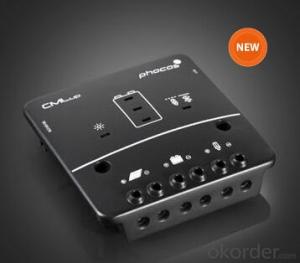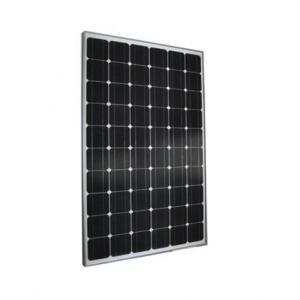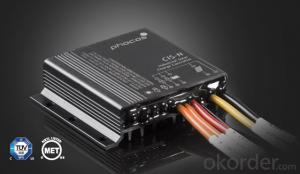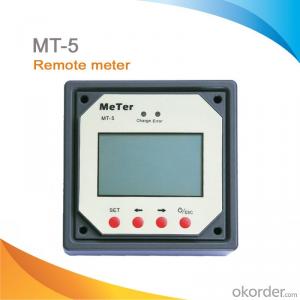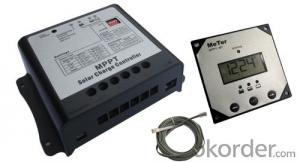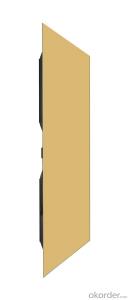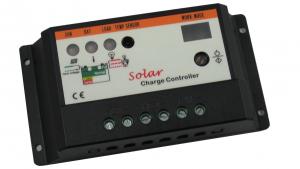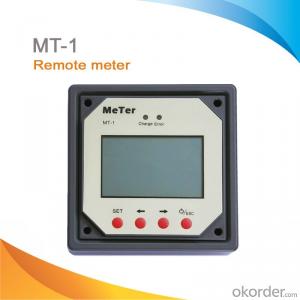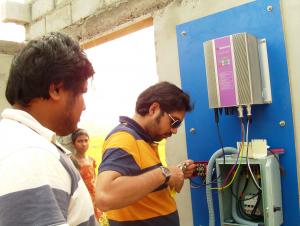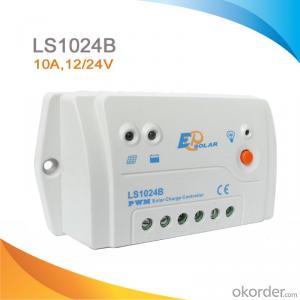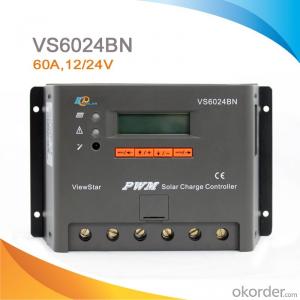CMLup Series (10 – 20 A) Solar Charge Controllers With Mobile Phone Charging Capability
- Loading Port:
- China Main Port
- Payment Terms:
- TT OR LC
- Min Order Qty:
- -
- Supply Capability:
- 10000 unit/month
OKorder Service Pledge
OKorder Financial Service
You Might Also Like
· SMD assembly, greater reliability
· New housing design
· High current rated MOSFETs
· High performance micro controller
· More intuitive LED design
· USB port for charging mobile phones or small music players
· Easily accessible terminals
· Easy mounting
· The CMLup series of charge controllers are equipped with a number of outstanding features such as a status display, alarm, and safety functions.
· The temperature-compensated, four-stage PWM charging algorithm
· (float-main-boost-equalization) is adjustable for sealed and vented lead-acid batteries.
· The CMLup charge controller also allows either a SOC or voltage-controlled low-voltage disconnect.
· Battery status is clearly indicated by three LEDs. An acoustic alarm warns about an impending low-voltage disconnect (LVD).
- Q:Can a solar controller be used in a solar-powered electric go-kart system?
- Yes, a solar controller can be used in a solar-powered electric go-kart system. A solar controller helps regulate and optimize the charging process of the batteries connected to the solar panels. In a solar-powered electric go-kart system, the solar controller would ensure that the energy from the solar panels is efficiently stored in the batteries and used to power the go-kart's electric motor.
- Q:Can a solar controller be used with solar panels that are connected to a solar heating system?
- Yes, a solar controller can be used with solar panels that are connected to a solar heating system. A solar controller is responsible for regulating and optimizing the flow of energy between the solar panels and the system they are connected to. In the case of a solar heating system, the controller will monitor the temperature of the system and adjust the flow of energy accordingly to maintain the desired temperature. This helps to maximize the efficiency and effectiveness of the solar heating system. Therefore, a solar controller is an essential component that can be used in conjunction with solar panels connected to a solar heating system.
- Q:What is the maximum load power consumption in standby mode of a solar controller?
- The maximum load power consumption in standby mode of a solar controller can vary depending on the specific model and manufacturer. However, it is typically quite low, ranging from a few milliwatts to a few watts. This low power consumption is essential to minimize energy wastage and ensure the efficient operation of the solar controller. By keeping the load power consumption low in standby mode, the solar controller can conserve energy and extend the overall lifespan of the system.
- Q:Can a solar controller be used with solar panels of different orientations?
- Solar panels of different orientations can indeed be used with a solar controller. The solar controller's role is to regulate the energy flow between the solar panels and the battery or load, and this is unaffected by the panels' orientation. Monitoring the battery's charge level and preventing overcharging or discharging are the primary functions of the solar controller. Therefore, as long as the solar panels are connected to the controller and it is correctly set up, it can effectively manage the energy flow regardless of the panels' orientations. It is worth mentioning, however, that the efficiency of the solar panels may vary depending on their orientation towards the sun, which can impact the overall performance of the solar system.
- Q:What is the maximum load capacity of a solar controller?
- The maximum load capacity of a solar controller typically varies depending on the specific model and brand. However, in general, solar controllers are capable of handling load capacities ranging from a few hundred watts to several kilowatts. It is essential to refer to the manufacturer's specifications and guidelines to determine the exact maximum load capacity of a particular solar controller.
- Q:Can a solar controller be used with different solar panel technologies?
- Yes, a solar controller can generally be used with different solar panel technologies as long as the controller is compatible with the voltage and current ratings of the panels. However, it is important to ensure that the controller is specifically designed to handle the specific technology and characteristics of the solar panels being used to optimize their performance and efficiency.
- Q:Can a solar controller be used in a solar-powered weather monitoring system?
- Yes, a solar controller can be used in a solar-powered weather monitoring system. A solar controller regulates the amount of power flowing from the solar panels to the batteries, ensuring the batteries are charged efficiently and preventing overcharging. In a solar-powered weather monitoring system, the solar controller would play a crucial role in managing the power supply to the system, allowing it to operate reliably and sustainably.
- Q:What is the maximum power capacity that a solar controller can handle?
- The specific model and manufacturer determine the maximum power capacity that a solar controller can handle. Solar controllers have the task of regulating the power flow from solar panels to batteries or other loads. They are typically rated in terms of their maximum current handling capacity, which is measured in amps. To calculate the maximum power capacity of a solar controller, multiply the maximum current rating (in amps) by the system voltage (in volts). For instance, if a solar controller has a maximum current rating of 30 amps and the system voltage is 12 volts, the maximum power capacity would be 360 watts (30 amps x 12 volts = 360 watts). It is crucial to select a solar controller that can handle the maximum power capacity of your solar system. Going beyond the maximum power capacity of a solar controller can result in overheating, reduced efficiency, or even damage to the controller. For this reason, it is advisable to refer to the manufacturer's specifications or seek professional advice to ensure that the solar controller is suitable for the power capacity of your specific solar system.
- Q:How does a solar controller prevent damage from overvoltage of batteries?
- A solar controller prevents damage from overvoltage of batteries by constantly monitoring the voltage levels and regulating the charging process. When the batteries are fully charged, the controller automatically reduces or stops the charging current to prevent overcharging, which can lead to damage or reduced battery life. This ensures that the batteries stay within a safe voltage range and protects them from overvoltage-related issues.
- Q:What is the maximum number of solar panels that a solar controller can handle?
- The maximum number of solar panels that a solar controller can handle depends on the specific model and its capacity. Different solar controllers have varying power ratings and can handle different numbers of panels. It is essential to refer to the specifications provided by the manufacturer to determine the maximum number of solar panels that a specific solar controller can handle.
1. Manufacturer Overview |
|
|---|---|
| Location | |
| Year Established | |
| Annual Output Value | |
| Main Markets | |
| Company Certifications | |
2. Manufacturer Certificates |
|
|---|---|
| a) Certification Name | |
| Range | |
| Reference | |
| Validity Period | |
3. Manufacturer Capability |
|
|---|---|
| a)Trade Capacity | |
| Nearest Port | |
| Export Percentage | |
| No.of Employees in Trade Department | |
| Language Spoken: | |
| b)Factory Information | |
| Factory Size: | |
| No. of Production Lines | |
| Contract Manufacturing | |
| Product Price Range | |
Send your message to us
CMLup Series (10 – 20 A) Solar Charge Controllers With Mobile Phone Charging Capability
- Loading Port:
- China Main Port
- Payment Terms:
- TT OR LC
- Min Order Qty:
- -
- Supply Capability:
- 10000 unit/month
OKorder Service Pledge
OKorder Financial Service
Similar products
New products
Hot products
Hot Searches
Related keywords
